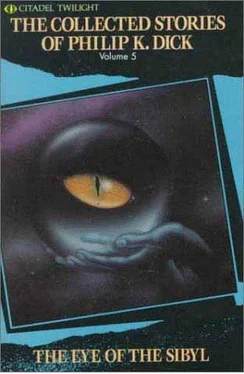“Say it.”
“I’m just a—” she choked out the word—“a visitor.”
“But I am right,” he said. “Say it. Admit it.”
“You’re right, Milt,” she sighed.
Two uniformed museum guards appeared, holding pistols. “You okay, Miss Ableseth?”
“For the present,” Mary said. She did not take her eyes off Milt and the rifle which he held. “Just wait,” she instructed the guards.
“Yes ma’am.” The guards waited. No one moved.
Milt said, “Did any Terran women survive?”
After a pause, Mary said, “No, Milt. But we Proxmen are within the same genus, as you well know. We can interbreed. Doesn’t that make you feel better?”
“Sure,” he said. “A lot better.” And he did feel like turning the rifle on himself now, without waiting. It was all he could do to resist the impulse. So he had been right; that thing had not been Fay, there at Field Three on Mars. “Listen,” he said to Mary Ableseth, “I want to go back to Mars again. I came here to learn something. I learned it, now I want to go back. Maybe I’ll talk to Dr. DeWinter again, maybe he can help me. Any objection to that?”
“No.” She seemed to understand how he felt. “After all, you did all your work there. You have a right to return. But eventually you have to begin here on Terra. We can wait a year or so, perhaps even two. But eventually Mars will be filled up and we’ll need the room. And it’s going to be so much harder here… as you’ll discover.” She tried to smile but failed; he saw the effort. “I’m sorry, Milt.”
“So am I,” Milt Biskle said. “Hell, I was sorry when that wug-plant died. I knew the truth then. It wasn’t just a guess.”
“You’ll be interested to know that your fellow reconstruct engineer Red, Cleveland Andre, addressed the meeting in your place. And passed your intimations on to them all, along with his own. They voted to send an official delegate here to Terra to investigate; he’s on his way now.”
“I’m interested,” Milt said. “But it doesn’t really matter. It hardly changes things.” He put down the rifle. “Can I go back to Mars now?” He felt tired. “Tell Dr. DeWinter I’m coming.” Tell him, he thought, to have every psychiatric technique in his repertory ready for me, because it will take a lot. “What about Earth’s animals?” he asked. “Did any forms at all survive? How about the dog and the cat?”
Mary glanced at the museum guards; a flicker of communication passed silently between them and then Mary said, “Maybe it’s all right after all.”
“What’s all right?” Milt Biskle said.
“For you to see. Just for a moment. You seem to be standing up to it better than we had expected. In our opinion you are entitled to that.” She added, “Yes, Milt, the dog and cat survived; they live here among the ruins. Come along and look.”
He followed after her, thinking to himself, Wasn’t she right the first time? Do I really want to look? Can I stand up to what exists in actuality—what they’ve felt the need of keeping from me up until now?
At the exit ramp of the museum Mary halted and said, “Go on outside, Milt. I’ll stay here. I’ll be waiting for you when you come back in.”
Haltingly, he descended the ramp.
And saw.
It was, of course, as she had said, ruins. The city had been decapitated, leveled three feet above ground-level; the buildings had become hollow squares, without contents, like some infinite arrangements of useless, ancient courtyards. He could not believe that what he saw was new ; it seemed to him as if these abandoned remnants had always been there, exactly as they were now. And—how long would they remain this way?
To the right an elaborate but small-scale mechanical system had plopped itself down to a debris-filled street. As he watched, it extended a host of pseudopodia which burrowed inquisitively into the nearby foundations. The foundations, steel and cement, were abruptly pulverized; the bare ground, exposed, lay naked and dark brown, seared over from the atomic heat generated by the repair autonomic rig—a construct, Milt Biskle thought, not much different from those I employ on Mars. At least to some meager extent the rig had the task of clearing away the old. He knew from his own reconstruct work on Mars that it would be followed, probably within minutes, by an equally elaborate mechanism which would lay the groundwork for the new structures to come.
And, standing off to one side in the otherwise deserted street, watching this limited clearing-work in progress, two gray, thin figures could be made out. Two hawk-nosed Proxmen with their pale, natural hair arranged in high coils, their earlobes elongated with heavy weights.
The victors, he thought to himself. Experiencing the satisfaction of this spectacle, witnessing the last artifacts of the defeated race being obliterated. Some day a purely Prox city will rise up here: Prox architecture, streets of the odd, wide Prox pattern, the uniform box-like buildings with their many subsurface levels. And citizens such as these will be treading the ramps, accepting the high-speed runnels in their daily routines. And what, he thought, about the Terran dogs and cats which now inhabit these ruins, as Mary said? Will even they disappear? Probably not entirely. There will be room for them, perhaps in museums and zoos, as oddities to be gaped at. Survivals of an ecology which no longer obtained. Or even mattered.
And yet—Mary was right. The Proxmen were within the same genus. Even if they did not interbreed with the remaining Terrans the species as he had known it would go on. And they would interbreed, he thought. His own relationship with Mary was a harbinger. As individuals they were not so far apart. The results might even be good.
The results, he thought as he turned away and started back into the museum, may be a race not quite Prox and not quite Terran; something that is genuinely new may come from the melding. At least we can hope so.
Terra would be rebuilt. He had seen slight but real work in progress with his own eyes. Perhaps the Proxmen lacked the skill that he and his fellow reconstruct engineers possessed… but now that Mars was virtually done they could begin here. It was not absolutely hopeless. Not quite.
Walking up to Mary he said hoarsely, “Do me a favor. Get me a cat I can take back to Mars with me. I’ve always liked cats. Especially the orange ones with stripes.”
One of the museum guards, after a glance at his companion, said, “We can arrange that, Mr. Biskle. We can get a—cub, is that the word?”
“Kitten, I think,” Mary corrected.
On the trip back to Mars, Milt Biskle sat with the box containing the orange kitten on his lap, working out his plans. In fifteen minutes the ship would land on Mars and Dr. DeWinter—or the thing that posed as Dr. DeWinter anyhow—would be waiting to meet him. And it would be too late. From where he sat he could see the emergency escape hatch with its red warning light. His plans had become focussed around the hatch. It was not ideal but it would serve.
In the box the orange kitten reached up a paw and batted at Milt’s hand. He felt the sharp, tiny claws rake across his hand and he absently disengaged his flesh, retreating from the probing reach of the animal. You wouldn’t have liked Mars anyhow, he thought, and rose to his feet.
Carrying the box he strode swiftly toward the emergency hatch. Before the stewardess could reach him he had thrown open the hatch. He stepped forward and the hatch locked behind him. For an instant he was within the cramped unit, and then he began to twist open the heavy outer door.
“Mr. Biskle!” the stewardess’s voice came, muffled by the door behind him. He heard her fumbling to reach him, opening the door and groping to catch hold of him.
Читать дальше









